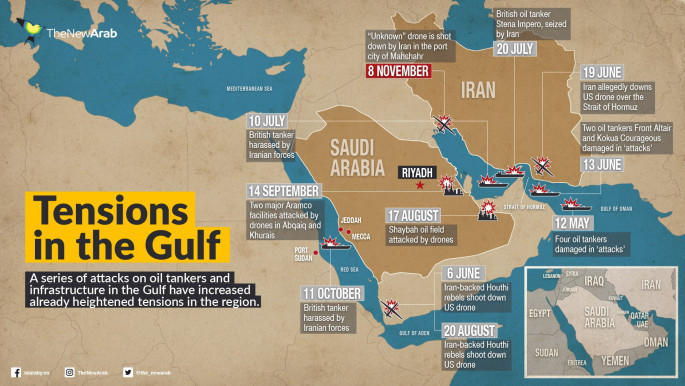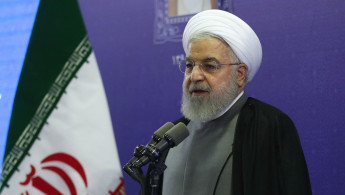UAE urges Iran talks with GCC, world powers to de-escalate regional tensions
The United Arab Emirates urged Iran to come to the negotiating table with world powers and Gulf countries in a bid to de-escalate regional tensions and revive its economy, reports said on Sunday.
UAE Minister of State for Foreign Affairs Anwar Gargash on Sunday warned against increasing tensions and urged for dialogue between conflicting parties.
“Further escalation at this point serves no one and we strongly believe that there is room for collective diplomacy to succeed,” UAE Minister of State for Foreign Affairs Anwar Gargash said in a speech in Abu Dhabi.
He warned against a “false choice” between war and the “flawed” atomic deal.
“I believe there could be a path to a deal with Iran that all parties might soon be ready to embark on. It will be long, and patience and courage will be required,” Gargash said.
The comments came after Kuwait confirmed earlier this month that it had relayed messages from Iran to Saudi Arabia and Bahrain following tensions in the Gulf region.
Khaled al-Jarallah, Kuwait’s deputy foreign minister said the message was conveyed, however “no answers” have yet emerged as a result.
Read more: Iran cancels accreditation for UN nuclear inspector
The comments came after Iran said President Hassan Rouhani sent letters to Saudi Arabia's King Salman on Tuesday in a bid to form "bilateral ties”, according to reports by Tasnim news agency.
"The theme of the letters has been regional peace and stability," government spokesman Ali Rabiee was quoted as saying Monday.
"We believe multiple bilateral ties could be shaped in the region, and the US pressures should not cause a distance between the neighbours," Rabiee added.
 |
The letters are the first of their kind since the two nations cut off relations in 2016.
Rabiee added that letters had also been sent to Bahrain's King Hamad bin Isa Al Khalifa.
President Rouhani pushed Iran's security and cooperation project in separate letters sent to various members of the Gulf Cooperation Council (GCC) and Iraq, Foreign Ministry Spokesperson Abbas Mosavi said Saturday.
The GCC is a six-nation bloc that groups Saudi Arabia, the UAE, Bahrain, Kuwait, Qatar and Oman.
The letters promoted the Hormuz Peace Initiative - a plan for peace in the region that sidelines US involvement.
Iran Foreign Minister Mohammed Javad Zarif pitched the Islamic Republic's Gulf security plan to neighbouring nations last month after President Rouhani announced the plan at the UN General Assembly in September.
Rouhani called on Gulf nations including arch-rival Saudi Arabia to join it but without giving futher details at the time.
In an article published in October by Kuwait's Al-Rai daily, Zarif said that the plan offered the chance of "expansive security" and cooperation between Iran, Saudi Arabia, Iraq, Oman, the UAE, Kuwait, Qatar and Bahrain.
Read more: US, six Gulf allies slap sanctions on dozens of Iran-Hezbollah entities
Cooperation could include areas such as a regional non-aggression pact, combatting terrorism, cybersecurity, energy and freedom of navigation, Zarif said.
"In order to save the region from the edge of ruin, we feel the necessity of realising a new discourse more than ever," he wrote in the article, a translation of which was provided by his ministry.
"The fate of the people and nations of the Persian Gulf is entwined ... either everyone benefits from security in the region or everyone will be deprived of it," Zarif said.
Tensions have risen in the Gulf since last year when US President Donald Trump unilaterally abandoned a 2015 nuclear deal between major powers and Iran and began reimposing crippling sanctions.
Read more: Saudi-Israeli relations: The emergence of a new alliance
They flared again this May when Iran began reducing its own commitments under the deal and the US deployed military assets to the region. Since then, ships have been attacked, drones downed and oil tankers seized.
Meanwhile, Iran on Saturday said it began enriching uranium to five percent, after a series of steps back from its commitments under a troubled 2015 accord with major powers.
The deal set a 3.67 percent limit for uranium enrichment but Iran announced it would no longer abide by it after Washington unilaterally abandoned the agreement last year and reimposed crippling sanctions.
"Based on our needs and what we have been ordered, we are currently producing five percent," Atomic Energy Organisation of Iran spokesman, Behrouz Kamalvandi told a press conference.
He said Iran has the "capacity to produce five percent, twenty percent, sixty percent, or any percentage" of enriched uranium, a claim often repeated by Tehran.
Uranium enrichment is the sensitive process that produces fuel for nuclear power plants but also, in highly extended form, the fissile core for a warhead.
The current five percent level exceeds the limit set by the accord but is less than the 20 percent Iran had previously operated and far less than the 90 percent level required for a nuclear warhead.
Follow us on Twitter and Instagram to stay connected!





 Follow the Middle East's top stories in English at The New Arab on Google News
Follow the Middle East's top stories in English at The New Arab on Google News


